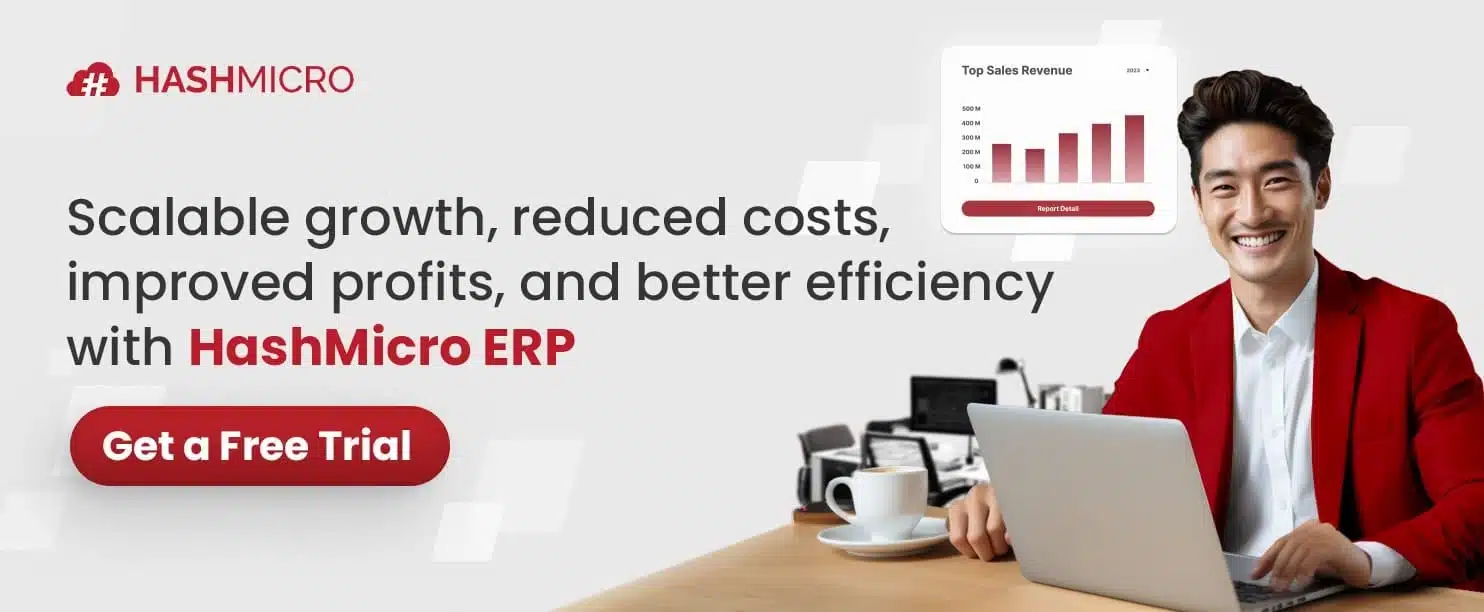Did you know that adopting a Competency Management System could directly boost your business performance? According to a recent study of 313 manufacturing SMEs in Malaysia, companies with stronger employee competencies significantly outperformed their peers.
But the research didn’t stop there, it also found that organizational agility multiplies these benefits. In other words, the more flexible and responsive your business is, the bigger the impact of investing in employee skills.
Choosing the right system can be tricky, but HashMicro CMS stands out in Malaysia for robust learning tools and data-driven performance tracking, plus this guide covers the 17 best competency management systems in Malaysia for 2025 to simplify your search.
Key Takeaways
|
What is a Competency Management System?
A competency management system is a digital tool that maps role requirements to employee skills, then tracks assessments and development progress in one place. With competency management system software, businesses can quickly see capability strengths, skill gaps, and who meets each role’s expected competency level.
It helps answer practical questions like who is ready for promotion, which teams need upskilling, and what training should be prioritized next quarter. Because roles are linked to clear competency criteria, decisions on hiring, training, and career paths become more consistent and evidence-based.
By aligning skills development with business goals, the system improves workforce readiness and reduces misplacement across roles. When choosing the best competency management system, prioritise one that supports structured assessments, targeted learning plans, and clear reporting for managers and HR.
Why is Competency Management System Important?
A Competency Management System plays a key role in building a high-performing workforce. Instead of relying on guesswork or outdated evaluations, it provides reliable data to guide people-related decisions.
With clear insights into employee capabilities, companies can identify future leaders, support reskilling efforts, and align talent development with business goals. It also helps maintain fairness and transparency in performance reviews.
17 Best Competency Management Systems in Malaysia
Before deciding on the right competency management system for your business, it’s important to know what each one offers, along with any potential limitations. To help you get started, here’s a look at the 17 best competency management systems in Malaysia for 2025.
1. HashMicro Competency Management System
Building a skilled, high-performing workforce doesn’t have to be complicated. HashMicro’s Competency Management System, integrated with ERP software, is designed to help businesses take full control of their employee development.
From identifying skill gaps to planning targeted training and tracking real-time progress, this system can do it all. Whether you’re running a growing team or managing a large workforce, this system adapts to your unique needs.
HashMicro also provides a free demo and consultation for companies and organizations that want to see how this system works.
It’s fully customizable and integrates effortlessly with HR, payroll, and performance modules, so all your people’s data stays connected in one ecosystem.
Features:
- Talent Management with KPI Tracking: Spot top performers at a glance. With built-in KPI tracking, you can monitor individual progress and guide employees toward growth that actually matters.
- Personalized Development & Training Plans: No one-size-fits-all here. Create tailored learning paths that match each employee’s career goals and your company’s direction.
- Competency Gap & Match Evaluation: Quickly see where employees shine and where they need support. The system maps actual vs. required skills to guide smarter upskilling.
- Built-in LMS for Ongoing Learning: Learning happens right where the work does. Access internal training modules and resources directly from the CMS; no separate system needed.
- Succession Planning: Plan for the future, today. Identify rising talent and groom your next generation of leaders, so you’re always ready for change.
- Deep-Dive Performance Analysis: Use the nine-box matrix to get a clear view of employee potential vs. performance. Make promotion and development decisions with confidence.
| Pros | Cons |
|
|
2. EdApp
EdApp is a competency management tool that helps businesses manage employee training and skill development more efficiently. It focuses on delivering engaging learning experiences through a mobile-first approach, making training content easy to access and absorb.
Key features include microlearning modules, real-time performance tracking, and gamification tools that keep learners motivated. The platform also allows businesses to create custom training content, making it easier to address specific learning goals.
Features:
- Microlearning courses
- Gamification tools
- Real-time analytics
- Custom content creation
- Mobile-first design
| Pros | Cons |
|
|
3, TalentGuard
TalentGuard is a competency management platform designed to help organizations build, track, and develop workforce skills effectively. One of its key strengths is the WorkforceGPT Copilot, an AI-powered tool that streamlines various competency management tasks.
Unlike many other platforms, TalentGuard uses AI to handle functions like generating job descriptions, building skill profiles, and mapping out career paths with minimal manual input.
Features:
- AI-powered job architecture
- Personalized career pathing
- Real-time skill gap analysis
- Integrated learning and development
- Comprehensive performance management
| Pros | Cons |
|
|
4. Avilar
Avilar is a software solution that combines competency and learning management to support companies in developing a skilled and capable workforce.
Its platform, WebMentor Skills™, is known for its ease of use and flexibility, enabling organizations to define, evaluate, and monitor employee competencies in line with training initiatives and business objectives.
Features:
- Competency tracking and management
- Skill gap identification
- Integrated learning management system (LMS)
- Customizable competency models
- Performance tracking tools
| Pros | Cons |
|
|
5. SkillStation by ThinkEleven
SkillStation by ThinkEleven is an all-in-one platform that manages training records, certifications, and competency evaluations in a single system.
Its modular structure sets it apart, offering core competency management features with the option to add tools like performance reviews, career development, and eLearning modules. This setup gives businesses the flexibility to begin with essential tracking features and scale up over time.
Features:
- Comprehensive competency management
- Integrated Learning Management System (LMS)
- Performance appraisal tools
- Training records and certification management
- Advanced reporting and analytics
| Pros | Cons |
|
|
6. Polaris Competency Management System
Polaris is a competency management system built to help organizations manage, monitor, and improve employee skills more efficiently. It integrates seamlessly with HRIS platforms, offering a centralized solution for planning, evaluating, and supporting workforce development.
The platform includes tools that cover the full competency management process, such as defining role-specific skills, assessing employee capabilities, and launching personalized development plans.
Features:
- Comprehensive competency tracking
- Integrated learning management
- Advanced reporting and analytics
- Mobile accessibility
| Pros | Cons |
|
|
7. Quinto by HRSG
Quinto, developed by HRSG, is a modern competency management and job description platform that simplifies how organizations define, apply, and maintain their competency frameworks.
This system is ideal for companies aiming to strengthen their talent management strategies by embedding competencies into job descriptions, employee assessments, and career development planning.
Features:
- Pre-built library of competencies and skills
- AI-powered job description creation
- Competency-based interview question generator
- Built-in tools for team collaboration
- Consistency scoring for maintaining standardized role profiles
| Pros | Cons |
|
|
8. Cognology
Cognology is a versatile competency management tool aimed at simplifying how organizations assess, manage, and grow employee skills. Its intuitive, device-friendly interface ensures both HR teams and employees can access and navigate the system with ease.
That said, some users have noted that mastering the more advanced features may take time and could require extra training or assistance.
Features:
- Skill and competency assessments
- Tools for managing employee performance
- Customizable branding options
- Optimized for mobile use
- Automated workflows
| Pros | Cons |
|
|
9. Mintra
Mintra’s Trainingportal distinguishes itself in the competency management field by focusing specifically on safety-critical sectors.
Unlike general platforms designed for a wide variety of industries, Mintra’s system is built in partnership with high-risk environments where even small skill gaps can lead to serious outcomes.
This focus is especially important for industries with rotating staff, where certain competencies may not be regularly applied during every shift or assignment.
Features:
- Integrated learning and competency management
- Extensive course library
- Offline access capability
- Safety critical industries learning system
- Mobile applications
| Pros | Cons |
|
|
10. SkillsDB Competency Management System
SkillsDB is a complete platform for skills tracking and competency management, built to support employee growth and performance. It covers everything from initial skill assessments to long-term development planning.
What makes SkillsDB stand out is its focus on simplicity and support. Unlike AI-heavy platforms, it offers a more personal approach with onboarding specialists who help set up tailored competency frameworks.
Features:
- Skills tracking and audits
- Competency management
- Training management
- Certification tracking
- Performance appraisal
| Pros | Cons |
|
|
11. Lexonis
Lexonis sets itself apart by combining ready-to-use competency frameworks with AI-driven customization tools. Its key strength lies in how it uses AI to simplify and enhance the framework creation process.
The platform offers multiple product tiers, Lexonis Essentials, TalentScape, and CareerTrack, giving businesses the flexibility to scale their competency initiatives over time.
Features:
- Competency framework development
- Pre-built job and skill libraries
- Career pathway visualization
- Integrated learning and development tools
- Comprehensive assessment and reporting
| Pros | Cons |
|
|
12. Fuel50
Fuel50 is a competency management platform that integrates advanced workforce planning with talent development and organizational flexibility.
It supports key areas like career growth, internal mobility, and skills data management, making it a powerful complement to existing HCM systems for building a more engaged and adaptable workforce.
Features:
- AI-powered talent marketplace
- Skills ontology and architecture
- Personalized career pathing
- Comprehensive workforce analytics
- Ethical AI and bias mitigation
| Pros | Cons |
|
|
13. Cloud Assess Competency Management System
Cloud Assess provides a powerful competency management solution designed for industries such as healthcare, construction, and manufacturing. It allows organizations to build comprehensive competency frameworks that align with specific job roles and sector requirements.
The platform features assessment options like self-evaluations and peer feedback to help accurately measure employee capabilities. Its gap analysis tool highlights areas where skills are lacking.
Features:
- Competency frameworks
- Skill assessments
- Gap analysis
- Integrated learning tools
- Progress tracking and reporting dashboards
| Pros | Cons |
|
|
14. Nestor
Nestor is a people intelligence platform built around skills and competencies, designed to enhance workforce flexibility, boost performance, and support employee development.
Its competency management features offer insights into how employees’ skills align with their current roles, future career goals, or performance benchmarks. That said, some large organizations find it challenging to manage and keep competency data up to date across varied roles.
Features:
- Competency framework design
- Skill evaluations
- Gap identification
- Customizable templates
- AI-driven recommendations
| Pros | Cons |
|
|
15. Cornerstone
Cornerstone OnDemand is a cloud-based platform for learning and talent management, offering strong competency-based performance tools alongside a full range of HR features. Its advanced framework tools enable organizations to build, manage, and monitor competencies.
Although it’s a powerful option for competency management, some users may find the platform complex due to its extensive features and may require extra guidance to use it efficiently.
Features:
- Competency tracking and management
- Automated skill assessments
- Learning and training management
- Performance evaluation tools
- Succession planning support
| Pros | Cons |
|
|
16. iMocha
iMocha sets itself apart in the skills management space with its AI-driven approach and focus on accuracy. Rather than relying on static databases or manual updates, it uses artificial intelligence to build precise job profiles and tailored skill assessments.
Its key advantage is a massive skills library across various industries, allowing organizations to define roles in greater detail than many competitors.
Features:
- AI-powered skills assessment
- Extensive skills library
- Role-based competency mapping
- Skill gap analysis
- Real-time analytics and insights
| Pros | Cons |
|
|
17. Instancy
Instancy is a flexible learning management system that includes strong competency management features.
That said, some users note that creating and customizing learning paths and competency frameworks for individual learners can be time-intensive, particularly for organizations with specialized needs.
Features:
- Competency mapping tools
- Skill gap identification
- Personalized learning path creation
- Supports blended learning formats
- Built-in assessment capabilities
| Pros | Cons |
|
|
Overall Comparison of the Best Competency Management Systems in Malaysia (2025)
| Provider | Connection Quality | Bank Coverage | Ease of Integration | Data Enrichment |
|---|---|---|---|---|
| HashMicro | ||||
| EdApp | ||||
| TalentGuard | ||||
| Avilar | ||||
| SkillStation | ||||
| Polaris | ||||
| Quinto | ||||
| Cognology |
How to Choose the Right Competency Management System for Business
Choosing the right Competency Management System (CMS) isn’t just a tech decision—it’s a strategic move that can shape how your business grows, adapts, and stays ahead of the curve. To make the most out of your investment, here are some important things to keep in mind:
- Start with your goals: Be clear on what you’re trying to achieve. Are you looking to boost team performance? Bridge skill gaps? Stay compliant? Knowing your priorities helps you filter through the noise and pick a CMS that actually fits your needs.
- Look beyond the basics: Make sure the system includes essential tools like skill assessments, gap analysis, performance tracking, and training management. Bonus points if it lets you tailor everything to your own competency models and workflows.
- Think long-term: Your business won’t stay the same forever—neither should your CMS. Choose a solution that grows with you, whether you’re expanding your team, restructuring, or adapting to new roles and requirements.
- Check how well it plays with others: A great CMS should integrate smoothly with your HRIS, LMS, or performance tools. Look for systems that offer APIs or ready-made integrations to keep everything connected and consistent.
- Don’t forget user experience: If it’s clunky, no one will use it. Go for a system that’s intuitive, easy to navigate, and accessible from any device. The more user-friendly it is, the faster your team will adopt it.
- Know who you’re working with: The right vendor makes all the difference. Look for providers with solid track records, positive reviews, and responsive support. Case studies and testimonials can offer valuable insight into what it’s really like to use their product.
With the right CMS in place, you’ll lay the foundation for smarter decision-making and long-term success. So take your time, ask the right questions, and choose a system that truly supports your growth.
Conclusion
Competency management software gives companies the tools to assess skills, close gaps, and grow talent effectively. With the right system, businesses can align workforce development with goals and make smarter HR decisions.
If you’re looking for a customizable, easy-to-use solution in Malaysia, HashMicro CMS is worth exploring. It adapts to your business structure, tracks employee progress, and connects seamlessly with HR, payroll, and more.
Plus, HashMicro offers a free demo and lifetime support, so you’ll never be left figuring things out alone. Talk to our team today with the free demo and see how HashMicro CMS can drive real results for your workforce!
FAQ About Competency Management Systems
-
What is the difference between competency management and performance management?
Competency management focuses on the skills, behaviours, and knowledge people need to succeed in a role, while performance management focuses on results, goals, and outcomes over a period. In other words, competency management measures capability, and performance management measures achievement—and they work best when linked.
-
Why is competency management important for my organisation?
It helps organisations standardise expectations across roles, reduce skills gaps, and make talent decisions more consistent—especially for hiring, promotions, and succession planning. As a result, teams can align development plans with business priorities instead of relying on subjective judgement.
-
How does competency management software improve employee performance?
It centralises competency frameworks, maps required competencies to roles, and highlights gaps through assessments—so learning plans become more targeted and measurable. Consequently, managers can coach based on clear criteria, employees know what “good” looks like, and performance conversations become more objective.
-
How often should competency models be updated?
Most organisations review them at least annually, and update sooner when there are major changes such as new tools, regulatory shifts, restructuring, or role redesign. For fast-changing functions (e.g., tech, analytics, customer success), a lighter 6-month review cadence often works better.









































